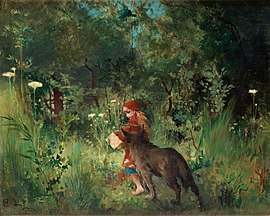
A fairy tale (alternative names include fairytale, fairy story, household tale,[1] magic tale, or wonder tale) is a short story that belongs to the folklore genre.[2] Such stories typically feature magic, enchantments, and mythical or fanciful beings. In most cultures, there is no clear line separating myth from folk or fairy tale; all these together form the literature of preliterate societies.[3] Fairy tales may be distinguished from other folk narratives such as legends (which generally involve belief in the veracity of the events described)[4] and explicit moral tales, including beast fables. Prevalent elements include dragons, dwarfs, elves, fairies, giants, gnomes, goblins, griffins, merfolk, monsters, monarchy, pixies, talking animals, trolls, unicorns, witches, wizards, magic, and enchantments.
In less technical contexts, the term is also used to describe something blessed with unusual happiness, as in "fairy-tale ending" (a happy ending)[5] or "fairy-tale romance". Colloquially, the term "fairy tale" or "fairy story" can also mean any far-fetched story or tall tale; it is used especially to describe any story that not only not true, but also could not possibly be true. Legends are perceived as real within their culture; fairy tales may merge into legends, where the narrative is perceived both by teller and hearers as being grounded in historical truth. However, unlike legends and epics, fairy tales usually do not contain more than superficial references to religion and to actual places, people, and events; they take place "once upon a time" rather than in actual times.[6]
Fairy tales occur both in oral and in literary form (literary fairy tale); the name "fairy tale" ("conte de fées" in French) was first ascribed to them by Madame d'Aulnoy in the late 17th century. Many of today's fairy tales have evolved from centuries-old stories that have appeared, with variations, in multiple cultures around the world.[7]
The history of the fairy tale is particularly difficult to trace because only the literary forms can survive. Still, according to researchers at universities in Durham and Lisbon, such stories may date back thousands of years, some to the Bronze Age.[8][9] Fairy tales, and works derived from fairy tales, are still written today.
The Jatakas are probably the oldest collection of such tales in literature, and the greater part of the rest are demonstrably more than a thousand years old. It is certain that much (perhaps one-fifth) of the popular literature of modern Europe is derived from those portions of this large bulk which came west with the Crusades through the medium of Arabs and Jews.[10]
Folklorists have classified fairy tales in various ways. The Aarne–Thompson–Uther Index and the morphological analysis of Vladimir Propp are among the most notable. Other folklorists have interpreted the tales' significance, but no school has been definitively established for the meaning of the tales.
- ^ "Grimm Brothers' Children's and Household Tales (Grimms' Fairy Tales)". sites.pitt.edu. Retrieved 22 October 2024.
- ^ Jorgensen, Jeana (2022). Fairy Tales 101: An Accessible Introduction to Fairy Tales. Fox Folk Press. 372 pages. ISBN 979-8985159233.
- ^ Bettelheim 1989, p. 25.
- ^ Thompson, Stith (1972). "Fairy Tale". In Leach, Maria; Fried, Jerome (eds.). Funk & Wagnalls Standard Dictionary of Folklore, Mythology & Legend. Funk & Wagnalls. ISBN 978-0-308-40090-0.
- ^ Martin, Gary. "'Fairy-tale ending' – the meaning and origin of this phrase". Phrasefinder. Archived from the original on 19 September 2020. Retrieved 21 August 2020.
- ^ Orenstein 2002, p. 9.
- ^ Gray, Richard (5 September 2009). "Fairy tales have ancient origin". The Telegraph. Archived from the original on 8 September 2009.
- ^ "Fairy tale origins thousands of years old, researchers say". BBC News. 20 January 2016. Archived from the original on 3 January 2018. Retrieved 20 January 2016.
- ^ Blakemore, Erin (20 January 2016). "Fairy Tales Could Be Older Than You Ever Imagined". Smithsonion Magazine. Archived from the original on 27 February 2019. Retrieved 4 March 2019.
- ^ Jacobs, Joseph (1892). . . p. 230 – via Wikisource.